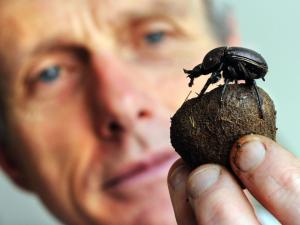We use crap as a vehicle for discovery
On making science accessible: We owe it to the public. We live in a society that allows us to do these crazy things, and it’s my job to give back, one: the knowledge and two: the process.
Marcus Byrne is an Associate Professor at Wits University, Johannesburg, South Africa, where he teaches zoology and entomology. His research interests revolve around the use of insects for biological control; which includes dung beetles. Dung beetles have a single-minded approach to life and its challenges. Dung beetle orientation is underpinned by an effective visual navigation system which can operate in the dimmest starlight, using limited computational power. This research won Marcus an Ignoble Prize in 2013 – an award he wears with pride as it gives opportunities to talk Science.
Talking points
I knew I wanted to be a biologist but…I was terrified of insects.
Dung Beetles are such enigmatic animals, hugely entertaining and really interesting.
The is the planet of the insects.
Having a big dung ball is a bit like having a Porsche
You hang around the bar – the pile of poo – with your big dung ball and hopefully pick up a chick – and roll it away with her.
That’s how you spend the day, finding poo, rolling dung balls and fighting off other males.
Observation triggers questions. Like most fields of science, as your dig into it you turn up more questions than answers, and that’s the joy of science.
A society that allows people to be curious and ask crazy blue-sky questions is a wonderful society. It’s part of the human condition – why is the sky blue? These are important questions, if we didn’t ask them we wouldn’t have poetry, or music or literature. I don’t think things have to have a purpose in themselves. I really believe that science should not have to be commercial as its basis.
We can learn things from these little guys. Â Their brains…are solving complex problems with very little computing power.
Learning from the Ignoble: Science is not a creed – it can be bent, folded, stapled, beat-up in any way you like and it still works. It’s this self-correcting system that doesn’t need respect
We use crap as a vehicle for discovery
On making science accessible: We owe it to the public. We live in a society that allows us to do these crazy things, and it’s my job to give back, one: the knowledge and two: the process.
Marcus was in Dunedin for the Science Teller Festival organised by the Centre for Science Communication at the University of Otago. We are grateful for the organisers of the Festival in their help in arranging this episode of Sustainable Lens.
Image:Â Chris Collingridge

